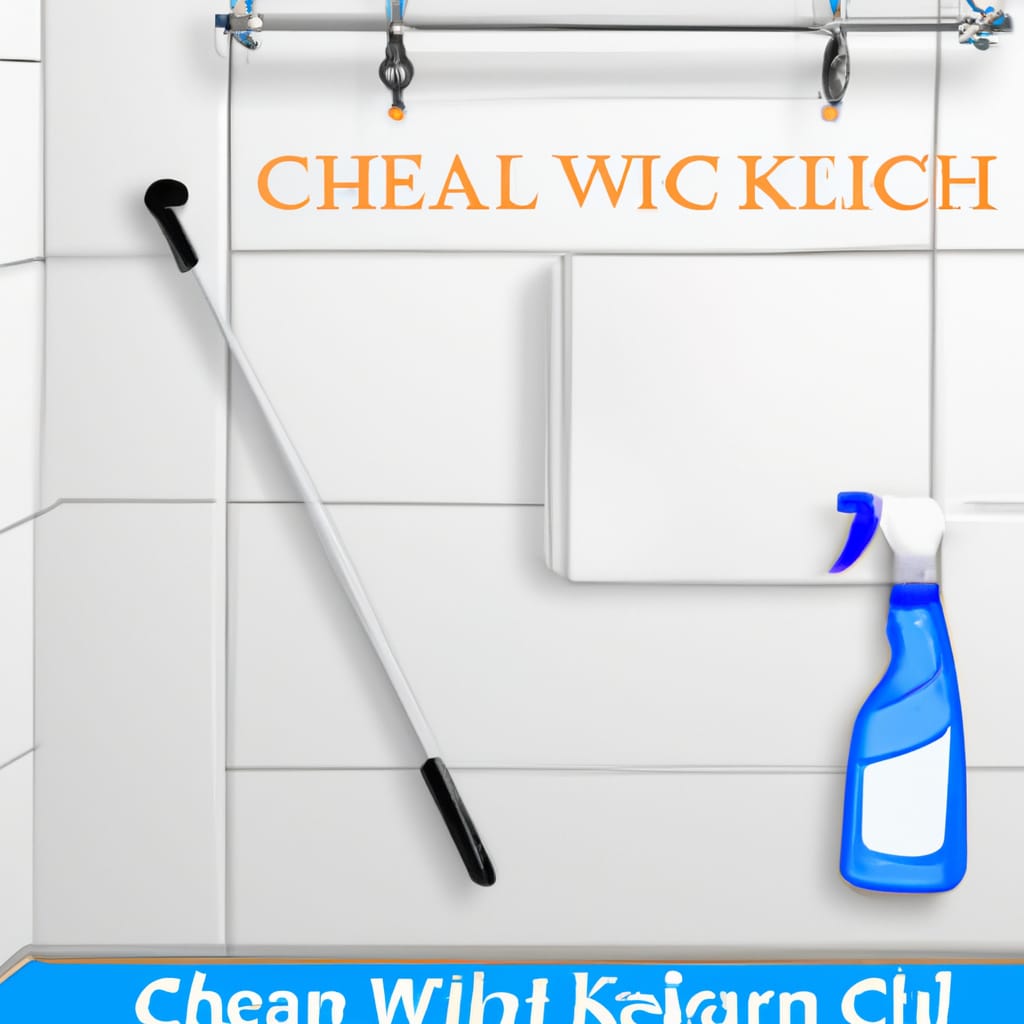No kitchen can look spotless and inviting if its walls are smeared and stained. Cleaning kitchen walls can be a daunting task, but with the right techniques and products, it can be done easily and effectively. Read on to learn how to get rid of grime and grease, and leave your walls sparkling clean and hygienic.

What Materials Are Needed to Clean Kitchen Walls?
To clean kitchen walls, you will need a mild detergent or all-purpose cleaner, warm water, a sponge or cloth, a bucket, and a dusting brush. If the walls are greasy, you may also need a soft scrubbing brush. Additionally, you may want to use a scrubbing pad for tougher spots. Before you begin, you should test a small area with the cleaning solution to make sure it does not damage the wall. Once you have the materials needed, you can begin by wetting a sponge or cloth with the warm water and adding a few drops of detergent or all-purpose cleaner. Gently scrub the wall with the sponge or cloth, and then rinse with warm water. If there are any stubborn spots, use the soft scrubbing brush and cleaning solution. Finally, use the dusting brush to remove any remaining dirt or dust.
How Should Kitchen Walls Be Prepped for Cleaning?
Before cleaning kitchen walls, it is important to prepare the walls properly. Start by dusting off the walls using a soft cloth or feather duster. If the walls are particularly dusty and dirty, use a vacuum to remove the dust. Then, use a mild detergent to wipe down the walls with a damp cloth. Rinse the walls thoroughly with clean water and dry them off with a clean, soft cloth or paper towels. If the walls are not painted, use a mild bleach solution to clean off any mold or mildew. Allow the walls to dry completely before applying a new coat of paint or other type of finish.
What Is the Best Way to Clean Kitchen Walls?
The best way to clean kitchen walls is to start with a gentle approach. Start by wiping down the walls with a damp cloth. If this does not remove all stains, try using a mild detergent and warm water. For tougher dirt and grime, mix a solution of baking soda and water. Apply the solution with a damp sponge and scrub the walls. Rinse with clean water and dry with a soft cloth. For grease and oil stains, mix a solution of equal parts white vinegar and water. Apply the solution to the stains, leave it to sit for a few minutes, and then scrub with a brush. Rinse any residue with clean water and dry with a cloth. Finally, for more persistent stains, use a commercial cleaner specifically designed for kitchen walls. Always follow the manufacturer’s instructions, and test the cleaner on an inconspicuous area first.
What Cleaning Ingredients Should Be Avoided When Cleaning Kitchen Walls?
When cleaning kitchen walls, there are some cleaning ingredients that should be avoided. Harsh chemicals such as bleach, ammonia, and abrasive cleaners should not be used to clean kitchen walls, as they can damage and discolor the surface. These chemicals can also emit strong fumes that can be hazardous to the health of those in the area. Additionally, oils, waxes, and polishes should not be used on kitchen walls, as they can attract dirt and grime, making the wall more difficult to clean in the future. Lastly, scouring pads, steel wool, and other abrasive materials should not be used to clean kitchen walls, as they can scratch and dull the wall’s surface.
Should Kitchen Walls Be Cleaned in a Specific Order?
It is not necessary to clean kitchen walls in a specific order, but it is important to use the right cleaning methods and products for each type of wall. Generally, it is best to start with the least abrasive cleaner and work up to the more abrasive products if needed. A dusting cloth can be used to remove loose dirt and dust from the walls, followed by a damp cloth to clean the surfaces. For tougher stains, a cleaner with a mild detergent may be necessary. If the walls are painted, a sponge mop or other cleaning tool should be used to avoid damaging the paint. After cleaning, the walls should be wiped dry with a clean cloth. In areas with high moisture, such as near the sink or stove, it may be necessary to use a mildew-resistant product.
How Often Should Kitchen Walls Be Cleaned?
Kitchen walls should be cleaned regularly to keep them hygienic and to maintain the aesthetic of the space. Depending on the type of surface, it is recommended to deep clean kitchen walls once a month. For walls with a painted or sealed surface, a damp cloth and mild detergent should be used to gently remove any dirt and grime. For walls with a porous surface, such as tile, a mild solution of bleach and water should be used to remove any bacteria and mildew. In addition to deep cleaning, everyday wiping down with a damp cloth can help to remove any splashes and other food debris. It is also important to regularly inspect kitchen walls for any signs of mold or mildew, and take appropriate measures to remove any growths. Regular cleaning and maintenance of kitchen walls will help to keep the space looking clean and hygienic.
What Are Some Tips for Maintaining Clean Kitchen Walls?
1. Wipe down kitchen walls with a damp cloth at least once a week to remove dirt and grime. 2. Clean up spills and splatters quickly to prevent them from becoming harder to remove. 3. Use a mild cleaning solution, like a mixture of warm water and dish soap, to scrub down walls. 4. Use a brush with soft bristles to scrub away any stubborn stains. 5. Rinse the walls with a damp cloth after scrubbing them down. 6. Dry the walls with a soft cloth to prevent water spots. 7. Avoid using harsh chemicals or abrasive scrubbing pads, which can damage the paint or wallpaper. 8. Touch up paint or wallpaper as needed to keep kitchen walls looking their best.




